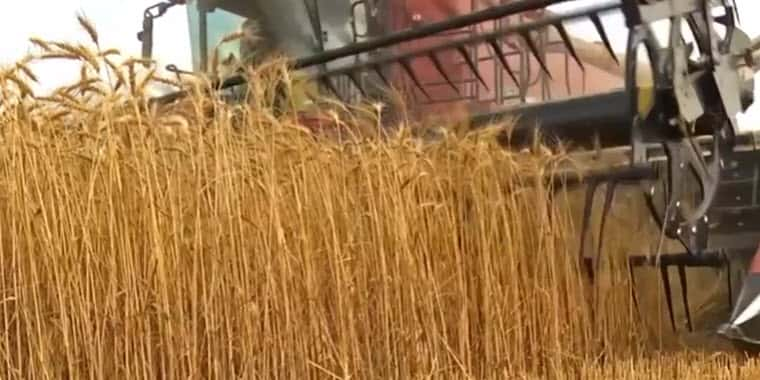Officials from the U.S. Commodity Futures Trading Commission (CFTC) recently visited four Farm Bureau members in Montana to discuss the futures markets. Commissioner Brian Quintenz and Chief of Staff Kevin Webb met with Sky Anderson and Monica Switzer from Wilsall and Ken and Cyndi Johnson from Conrad to discuss the functionality of the futures markets, which the Commission helps oversee. The visit was prompted by the Montana Farm Bureau D.C. Fly-in last month when members had a meeting with Quintenz who expressed interest in visiting farmers and ranchers in Montana.
The Commission’s primary responsibility is to investigate and prosecute anyone illegally manipulating the futures markets and making sure there is integrity in the futures market.
“Most of the cases we investigate are referred to us by whistle blowers, the Securities and Exchange Commission (SEC) and our own observation department,” Quintenz said. The monitoring is necessary to prove a market manipulation case is intensive; sometimes it includes creating their own software so the CFTC can simulate massive electronic trading suspected in manipulation.
MFBF Vice President Cyndi Johnson, a wheat farmer from Conrad, told the commission that farmers and ranchers use the futures market for a reference. “All the market fundamentals indicate prices should be increasing, but they just keep dropping. With flooding in the Midwest and late planting or acres that didn’t get planted, stocks are down yet prices continue to fall. The current wheat market doesn’t follow what is happening in production agriculture.”
Anderson mentioned that his ranch hasn’t used hedging for years because the market can’t be analyzed based on fundamentals that used to determine price. He questioned if the large number of speculators has led to more market volatility.
Commissioner Quintenz answered that they have a department that looks at market analysis with respect to indicators and price. He said that the increased concentration of trading firms and the concentration of trades may be increasing market volatility. The proliferation of automated trading strategies also effects volatility with large instances of flash moves up and down in the market right after the release of USDA commodity price reports.
Quintenz noted problems with cattle contracts are now being addressed. “For quite some time the CME Group did not have a cattle market analyst. They have increased delivery options and started a program that incentivizes proper sorting and grouping of cattle,” noted the commissioner. “They have contracted hours of trade to consolidate liquidity.”
He explained the key points about the U.S. Commodity Futures Trading Commission which included reporting suspicious activity to the CFTC; know that it takes time to build case; and market integrity is now more transparent with bids and offers—however, the electronic nature of the market allows for more bad actors and manipulation strategies.
Anderson noted, “After visiting with the CFTC, they made it clear they are here to ensure the integrity of the markets; policing is a large part of making sure the markets are functioning properly. They explained they can’t look at daily trade activity but the trends. I told them there is a disconnect between the futures markets and cash commodities. These seem to be abused by the big trading companies who aren’t concerned about how they are affecting actual commodities. It was impressive that Commissioner Quintenz and Chief of Staff Webb wanted to have some face-to-face time with farmers and ranchers in our state.”
###
MFBF


